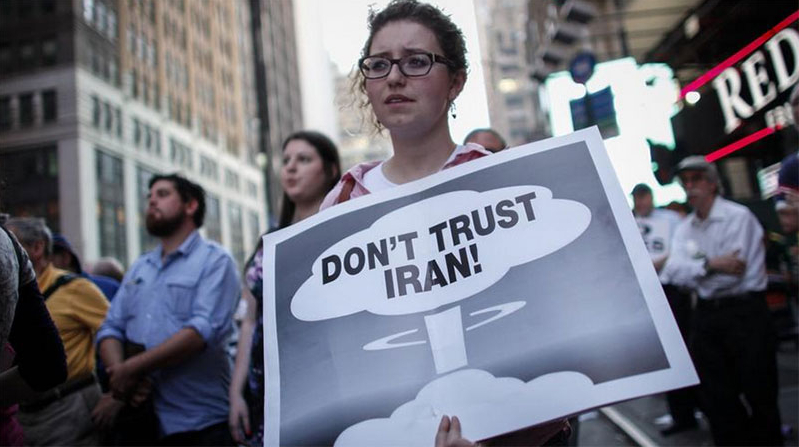
Protesters went to a federal building in Los Angeles in opposition to the nuclear deal with Iran on Sunday. The deal is currently being scrutinized by Congress before it goes to a vote.
According to Melissa MacBride of KABC, hundreds of people gathered at the federal building in the Los Angeles neighborhood of Westwood on Sunday afternoon to protest the historic deal reached by the U.S. and Iran, which would grant sanctions relief in return for curbing Iran's atomic program. The protesters waved both Israeli and American flags.
"Congress should say this is a terrible deal, which is what it is," said Rabbi Marvin Hier, the founder of the Simon Wiesenthal Center.
MacBride reported that the Obama administration brokered the agreement with Iran; Congress has 60 days to review it. Hier argued that the deal, which is supposed to keep Iran from developing a nuclear bomb for at least 10 years, would allow the Middle Eastern country to fund terrorist groups.
"What do we think they gonna do when they're rich with $750 billion? They're going to fund all the terrorist organizations in the world," Hier said.
According to KABC, the deal, which is about 100 pages, marked a dramatic break from decades of animosity between the United States and Iran. President Barack Obama defended the deal.
"I can say with confidence, but more importantly nuclear experts can say with confidence, that Iran will not be in a position to develop a nuclear bomb. We will have met our number one priority," Obama said.
KABC reported that unless the Republican-dominated Congress blocks it, the deal will take effect.
Roz Rothstein, the CEO of international Israel education organization StandWithUS, told Sophia Kunthara and John Cadiz of NBC Los Angeles that Iran's "aim is to go nuclear."
"We really have to look at their behavior," Rothstein said. "We really have to take a look at what they're saying and what they're doing."
Rothstein added that the deal made "no sense" to him. Protester George Haroonian seemed to echo his sentiment.
"This deal will legitimize and empower a regime that not only pressures and imprisons its own people, cracks down on its own people, but has the intention to have hegemony in the region," Haroonian said. "Its actions have caused wars and strife and obviously this is not to the interest of the United States, far from it."
However, John Glaser, manager of media relations at the Cato Institute, argued in an editorial published by Al Jazeera America that such arguments against the deal relied on "specious assumptions and misinformation." He contended that resuming the "policy of escalating economic sanctions and isolation" would empower hardliners in Iran.
"It's hard to imagine another moderate being voted into office in Iran after an embarrassing rebuff by an America unwilling to negotiate," Glaser wrote in reference to current Iranian President Hassan Rouhani. "Besides, the broad international coalition that has cooperated with the U.S.'s harsh sanctions regime would disintegrate if Washington, by abandoning the deal, showed itself wholly unserious about diplomacy."
Glaser also warned that the alternative to making the deal was war with Iran. He noted that this was a popular option by many hawkish politicians, in particular Republican presidential candidate Scott Walker.
"Leaving aside the fact that military action would be totally illegitimate under international law, given that Tehran presents no threat to the physical security of the United States, war would be nothing short of catastrophic," Glaser wrote. "Even limited airstrikes of specific enrichment sites would lead to large-scale Iranian retaliation against U.S. assets and allies in the region."
Glaser cited nuclear experts and arms control specialists who thought that the deal, if implemented properly, would do a lot of good.
"This deal effectively ensures against an Iranian nuclear weapon for well over a decade," Glaser wrote. "Iran has powerful incentives to stick to the deal, for violating it would precipitate renewed economic sanctions and conflict with the West."







